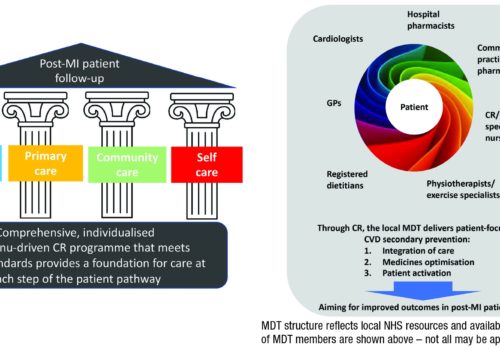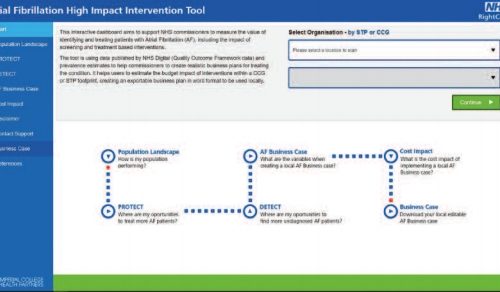This audit was carried out using the GRASP-HF audit tool developed by PRIMIS designed to help busy practices achieve a systematic approach to the identification, diagnosis and management of patients with HF.


Working with patients who are not willing to engage fully with healthcare services is a common occurrence. The process requires patience and a focus on providing the patient with full information about their condition and then allowing them to make decisions about their treatment. Here, Dr Terry McCormack (GP and Cardiovascular Lead, North Yorks) describes the approach of his practice to a man with hypertension.

Although overall CV mortality has declined in recent years, patients with clinically manifest CVD remain at increased risk of recurrent CV events. A group of HCPs at UK primary and secondary care centres have recently developed a consensus statement to improve delivery of secondary prevention in the UK.

In 2017 the University of Sheffield was commissioned by Public Health England (PHE) to develop a new return on investment (ROI) tool for cardiovascular disease (CVD) prevention, to be used by national and local decision-makers. The tool focuses on prevention of CVD in six key high-risk groups, identified through the NHS RightCare pathway as being currently underdiagnosed and insufficiently well managed. This includes patients with hypertension, diabetes (type 1 and type 2), non-diabetic hyperglycaemia, atrial fibrillation, chronic kidney disease and high cholesterol (the latter including patients with a QRISK2 score ≥ 10% or familial hypercholesterolaemia).

Cardiovascular disease (CVD) prevention has been highlighted by the Next Steps on the Five Year Forward View as a key priority for clinical commissioning groups (CCGs). An important area of focus is improving the management of high-risk conditions for CVD, such as atrial fibrillation (AF). In response to this escalating healthcare priority, Imperial College Health Partners have developed the new AF High Impact Intervention Tool in collaboration with NHS RightCare, as part of their CVD Prevention Pathway.

We know that there are differences in outcomes between populations that cannot be explained by the dictates of evidence-based medicine or by demographics. Core to the work of NHS RightCare is the concept of unwarranted variation and the vital importance of using our shared NHS resources to deliver the best outcomes for our population. In 2018, NHS RightCare developed the toolkit for physical ill health and cardiovascular disease (CVD) prevention in people with severe mental illness (SMI), in close collaboration with Public Health England (PHE).

Behavioural risk factors such as poor diet, smoking and low physical activity, along with high blood pressure, high body mass index and high cholesterol are the main risk factors for cardiovascular disease (CVD). The Heart Age Test is a digital online tool designed to help make sense of an individual’s risk of CVD, the implications of that risk and the behavioural changes needed to reduce that risk.

The benefits of lipid modification therapy in reducing cardiovascular disease (CVD) risk have been well recognised since the advent of effective treatments, including the HMG-CoA reductase inhibitors (statins). Use of statins is likely to have been a contributory factor in the fall of over 75% in CVD mortality in many industrialised countries over the last 40 years. Other interventions, including improved management of other cardiovascular risk factors, notably hypertension and smoking, have also been important. However, CVD continues to be responsible for one in four premature deaths in the UK, with rates in the most deprived 10% of the population being almost twice as high as in least deprived cohorts.

Community pharmacists are widely recognised as an under-utilised resource within the NHS, in spite of their skills and experience, and the accessibility of their premises. In recent years, community pharmacists have demonstrated the value of the clinical services they offer, particularly in the prevention of cardiovascular disease (CVD).

Cardiovascular disease (CVD) is the leading cause of death worldwide. Elevated blood pressure (BP) is the main global risk factor for premature morbidity and mortality, and the prevalence of hypertensive heart disease is not declining over time. Improved control of high BP is, therefore, fundamental to further prevention of CVD, and adoption of treatment guidelines can have a positive impact on BP-related outcomes.
A unique new e-platform for primary care

For healthcare professionals in countries with applicable health authority product registrations. The content may not be approved for use in your specific region or country. Please review the applicable product labelling for your country for indications and instructions prior to use. If not approved, please exit this site.
We use cookies to ensure that we give you the best experience on our website.
By continuing to this site you are confirming that you are a healthcare professional and are opting into the use of cookies.
Yes, proceed to the site



















